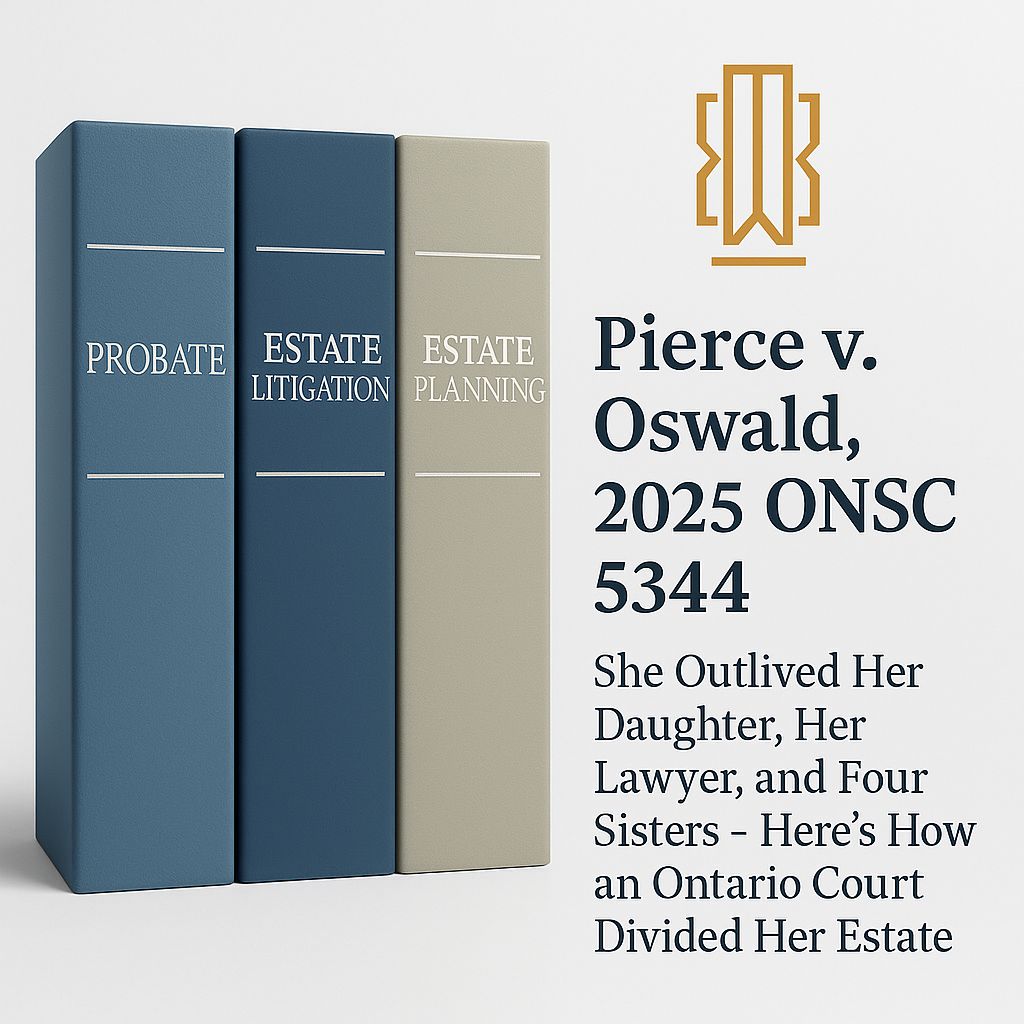Overview
The case of Pierce v. Oswald, 2025 ONSC 5344, decided by Justice A.A. Sanfilippo of the Ontario Superior Court of Justice on September 19, 2025, centers on the interpretation of a will’s residue clause. The estate trustee, Mary Pierce, sought the court’s advice and direction under Rule 75.06 of the Rules of Civil Procedure regarding the Last Will and Testament of Frieda Holzgethan, dated December 22, 1997. The key issue was how to distribute the estate’s residue after Frieda’s daughter predeceased her, with the will directing division “into equal shares per stirpes” among Frieda’s five sisters, four of whom had predeceased Frieda. The court interpreted the clause to benefit each sister’s family branch equally, rejecting a narrower distribution to only the surviving sister. This unopposed application highlights principles of will construction, emphasizing the testator’s intent and the meaning of “per stirpes.” The decision ensures the residue is divided into one-fifth shares per sibling line, passing to their descendants where applicable.
The Facts
Frieda Holzgethan, a 91-year-old Toronto resident, died on July 15, 2016. Her husband, Alexander, had predeceased her before she made her will in 1997. Frieda’s only child, Magrid Holzgethan, was named sole executor, trustee, and residuary beneficiary but predeceased Frieda. The alternate executor, lawyer Frank B. Musil, also predeceased Frieda.
Frieda had five sisters: Paula Schranz, Justine Krutzler, Angela Wölfer, Maria Wölfer (all predeceased Frieda), and Hilda Oswald (who survived Frieda but died in 2020). All sisters’ spouses had predeceased Frieda. The surviving family members at Frieda’s death included:
- Hilda Oswald and her four children: Werner Oswald, Franz Oswald, Walter Oswald, and Gabriele Blazek.
- Adelheid Wagner (Paula Schranz’s only child).
- Franz Krutzler and Ewald Krutzler (Justine Krutzler’s two children).
- Eberhard Wölfer (Angela Wölfer’s only child).
- Eduard Wölfer and Edeltraud Steiner (Maria Wölfer’s two children).
All these relatives reside in Austria.
Mary Pierce, a family friend, was appointed estate trustee on February 23, 2021, after the family consented and declined to act themselves. The will’s residue clause (Clause 3(d)) directed division “into equal shares per stirpes” among the five sisters “for their own respective uses absolutely,” with a fallback to surviving issue if all sisters predeceased Frieda (which did not apply since Hilda survived).
Pierce proposed distributing the residue in one-fifth shares per sister, passing predeceased sisters’ shares to their children (the “Family Branch Distribution”). However, an Austrian lawyer for Werner Oswald argued the entire residue should go to Hilda’s estate (the “Surviving Sibling Distribution”), prompting this application. The respondents were served via the Hague Convention but did not appear. The application was supported by Pierce’s unchallenged affidavit.
The Law
The court’s interpretation followed established principles of will construction under Ontario law, primarily from cases like Ross v. Canada Trust Company, 2021 ONCA 161; Trezzi v. Trezzi, 2019 ONCA 978; and Dice v. Dice Estate, 2012 ONCA 468. The overarching goal is to ascertain the testator’s subjective intention by placing the court in the testator’s “armchair” at the time of making the will, considering surrounding circumstances and the will as a whole (Burke (Re), [1960] O.R. 26 (C.A.)).
Key concepts include:
- Per Stirpes vs. Per Capita: “Per stirpes” means distribution by family branch (stirp), allowing intergenerational transfer to descendants if a beneficiary predeceases the testator (Dice, at para. 12). This contrasts with “per capita,” where gifts lapse if the beneficiary predeceases, benefiting only survivors.
- Ambiguity Resolution: Courts resolve ambiguities by giving effect to all words, avoiding surplusage, and prioritizing the testator’s intent (Dice, at para. 59; Jonas v. Jonas, 2022 ONCA 845, at para. 20).
- Anti-Lapse Provision: Section 31 of the Succession Law Reform Act (SLRA) saves lapsed gifts to siblings from lapsing if they leave surviving issue, absent contrary intent, distributing as if the sibling died intestate immediately after the testator.
- Service and Procedure: The application complied with Rules 9.01(2)(b), 75.06(2), and 17.02-17.05 of the Rules of Civil Procedure, allowing service abroad without leave for will interpretation claims.
Costs in estate litigation are often payable from the estate where necessary to effect the testator’s intent (Geffen v. Goodman, [1991] 2 S.C.R. 353; Westover Estate v. Jolicouer, 2024 ONCA 81).
Analysis
The court identified three possible interpretations of Clause 3(d): (1) Family Branch Distribution (per stirpes to each sibling’s line); (2) a variant saved by SLRA s. 31 (yielding the same result); or (3) Surviving Sibling Distribution (per capita to Hilda only).
Justice Sanfilippo adopted the first, finding Frieda’s intent was intergenerational based on:
- Per Stirpes Meaning: The term implies family-branch sharing, not lapsing gifts (Dice). Disregarding it would render it surplusage, contrary to construction principles.
- No Contrary Intent: The will lacks express words limiting gifts to survivors or voiding predeceased shares. Naming all five sisters shows equal benefit intent.
- Holistic Reading: Clauses 4 and 6 (handling minor beneficiaries) support intergenerational gifts, as sisters were not minors. The phrase “for their own respective uses absolutely” was overridden by “per stirpes,” with “their” interpreted to include descendants.
- Ambiguity Resolution: While Clause 3(d) mixes per stirpes and individual naming (creating ambiguity), the court prioritized intent to benefit all branches, consistent with Dice and Jonas.
SLRA s. 31 was inapplicable since gifts did not lapse but passed per stirpes. The Surviving Sibling Distribution was rejected as unsupported by the will’s language.
The decision was unopposed, but the court independently verified intent (Hejno v. Hejno, 2025 ONCA 249). Costs of $32,878.87 were awarded from the estate as reasonable for administration.
Lessons Learned
This case underscores key takeaways for estate planning and litigation:
- Precise Drafting Matters: Ambiguities from terms like “per stirpes” can lead to costly court applications. Testators should clearly specify if gifts are intended to lapse or pass intergenerationally, avoiding mixed per stirpes/per capita language.
- Testator’s Intent is Paramount: Courts will holistically interpret wills to honor subjective intent, using the “armchair rule” and avoiding rigid rules (Ross). Surrounding circumstances (e.g., family structure) inform this, even without extrinsic evidence.
- Per Stirpes in Practice: The term enables equal family-branch treatment, protecting against lapsed gifts. Drafters should use it deliberately for intergenerational benefits, as in Dice.
- Anti-Lapse Safeguards: SLRA s. 31 provides a backup for sibling gifts but requires no contrary intent. Here, it was unnecessary due to per stirpes.
- Estate Trustee Duties: Trustees like Pierce exemplify prudence by seeking court directions on ambiguities, ensuring fair distribution and indemnity for costs. Unopposed applications still demand judicial scrutiny.
- International Elements: Service abroad via the Hague Convention works efficiently, but non-appearing respondents risk default outcomes. Families in multiple jurisdictions should consider local laws and consents early.
Overall, the ruling promotes equitable distribution aligned with familial intent, reinforcing the need for clear wills to minimize disputes.
Facing Estate Litigation, Probate, or Guardianship Challenges?
At Bobila Walker Law, Managing Partner Daniel Walker and our team of experienced Ontario lawyers specialize in complex estate disputes, will challenges, fiduciary litigation, probate administration, and guardianship matters. With over 20 years of combined expertise and a proven track record in the Ontario Superior Court of Justice (including the Estates List), we deliver personalized, results-driven representation across Toronto, the GTA, and beyond—from Markham and Mississauga to Ottawa and Barrie. As a trusted German-speaking firm, we handle cross-border issues with precision and care.
Contact Daniel Walker today for a confidential consultation:
Email: daniel@bobilawalkerlaw.com
Phone: 416-847-1859
Website: www.bobilawalkerlaw.com






